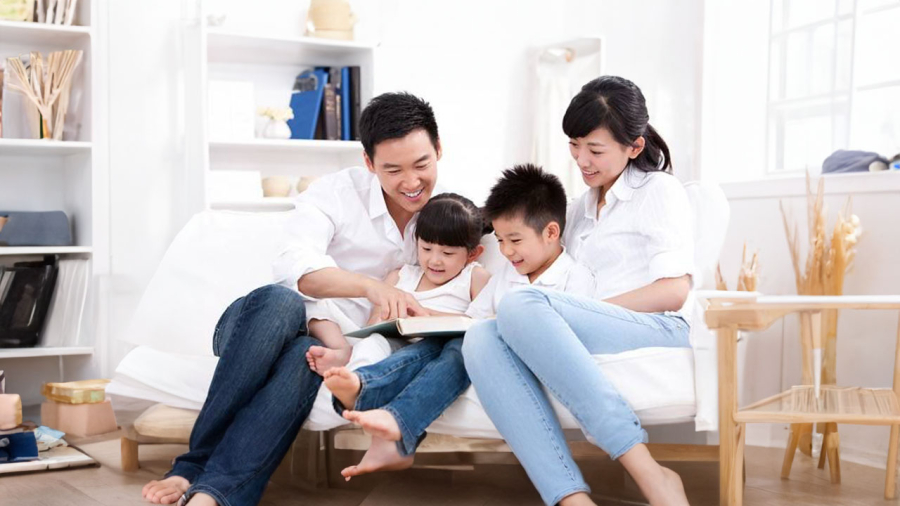Being a parent and having a baby in this era is sometimes very difficult, unlike our parents’ time. Therefore, for parents, children seem to be even more important. No matter what era, children are always the love of their parents. But I don’t know when people started saying that “Children are the most precious assets of parents”.
Many people spend their whole lives saying “because of the children”, everything revolves around the children. They are happy or sad, they bear it or they are timid, they still say “because of the children”. But maybe because of too much love, many parents put too much pressure on their children by having too many expectations.
For parents, nothing is more precious than children. In every choice, children can be put first. They can sacrifice, they can do everything, change themselves for their children, they are willing to shed their own blood for their children.
However, Dr. Bui Tran Phuong, an education manager, a Vietnamese scientist, former rector of Hoa Sen University, shared with parents that: Raising children should not say the phrase “Children are the most precious assets of parents” because love is not pressure, but for children to live their own lives.

When you consider children as assets: Children are independent individuals with their own lives. Why do children become assets? Because assets are things like houses, smartphones, motorcycles, cars, televisions… When considering children as assets, we invisibly turn them into things that we own. When the sense of ownership arises, we often have misguided love. We turn our children into tools to achieve our goals. Many people who have not succeeded in life then force their children, use their children’s lives to fix their own mistakes, and use their children’s lives to fulfill their own lives.
When considering children as assets, we are prone to putting a burden on their shoulders. Many children feel pressure because their parents suffocate them with love, they don’t allow their children to grow freely, always claiming to do it out of love for their children, but in reality, they are restraining their children.
Therefore, think of children as the greatest love, children are the most precious, rather than children being the greatest asset.
Parents for their children or for themselves: We often say that it is because of the children, parents do it for the children… But the children say they don’t like it. So who is it for? Instead of imposing it on the child and believing that parents should do it for the child, negotiate, convince until the child realizes that they like it, rather than imposing it and then complaining, “Parents do it for the child.” We think it’s for the child, but we must understand how the child feels about it, how they accept it, whether they like it or not. Don’t think that young children aged 2-3 are easy to impose on. Young children have awareness and form their own preferences and personalities. Therefore, parents need to have moderation in deciding for their children.

Never think that we gave birth to the child, we love the child so much that we have the right to make decisions for the child when they are young. Create a mindset to see the child as an independent individual to respect the child, to communicate with the child. This way, the child learns to be independent, not relying on others and taking responsibility for their own lives. Children can have different interests and decisions than us because they are not miniature versions of us, they are themselves.
So many parents are only satisfied when their children follow their wishes and are unhappy when their children do things against their wishes. But calmly observe why the child acts against your wishes. For example, we want our child to pursue a singing career but the child doesn’t like it, the child is not passionate about it. We think it would be good for the child to do it, but would it really be good when the child doesn’t like it like we do?
Love your children but don’t impose on them: Giving birth to a child, raising a child is the duty and also the happiness of parents. Raising children is a process for parents to learn and grow together with the child, not to impose their own experiences on the child. Each era has its own changes, each person has different perceptions, different preferences, and personalities. Children are sometimes not replicas of ourselves. Children sometimes resemble us in the past, we have to go through to realize, but now we might not realize it, like we were in the past. Therefore, never impose, never own the child, but respect the child’s privacy, value negotiation, persuasion, analysis, and let the child gradually make decisions instead of deciding everything for the child just because we think that young children don’t know anything, the child is our child, everything we do is for the child.
Parents also need their own lives: Many people feel pressured when their whole life revolves around their children and they complain to their children all the time that their whole life is for their children. Sometimes children feel guilty because they don’t know how to repay their parents. That is not the case in all families, but many families find themselves in this situation. Therefore, love your children for who they are, but remember that children have their own lives, and we also need to balance our lives for our children and for ourselves. When you have balance, your child will also have balance. Excessive love is not good either. Don’t let your children feel indebted to you. In a family, in order to be happy, each individual must have their own happiness combined with the common happiness. If one side keeps sacrificing or only knows how to give without receiving, and is not willing to receive, it is all imbalanced.
Nowadays, parents have more access to knowledge about raising children and there are also more sources of information. Children are also different from our parents’ generation. So being a parent now means learning multidimensionally, adjusting oneself first to better educate children.
Learning Tips for Parents: 12 Japanese Techniques to Use with Your Children
Discover the 12 principles of teaching children in the traditional Japanese way that parents can learn with Dien May XANH! By instilling these principles when your children are young, you can ensure that they grow up to be obedient, smart and polite, the hallmarks of a successful education in Japan.





































